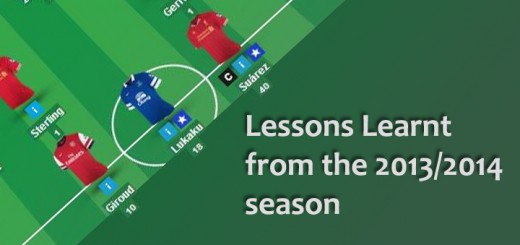Once the final whistle had blown on the 2014/2105 Premier League season, my 6th as an FPL manager, I found myself in the surreal and humbling positon of finishing first in a game of over 3.5 million players. The question that I kept being asked and, naturally, the one I was asking myself was; ‘How did that happen?’
My instinctive answer to that question was and still is; ‘luck’. In a game of this many players, it takes more than just a good strategy to win it. But, that said, I’m not sure anyone is that lucky either.
Having looked back through the season, there were certain identifiable principles that I followed that helped to stack the odds in my favour. So, with a substantial nod to Lady Luck, here are what I perceive to be the four key principles I followed which helped me to win the FPL this season.
1. Flexibility and Balance.
Time is not always a good thing for an FPL manager to have too much of. In preseason, presented with time and an ever-increasing number of data sources and opinions, we instinctively search for the ‘next Michu’. Yet, more often than not, we seem end up with the current one.
Uncharacteristically, I managed to avoid ‘over-thinking’ my initial squad selection. Sure, I had Bojan and Tadic, but these ‘riskier’ selections were adequately compensated for by a much greater number of reliable, proven FPL players including Mata, Rooney, Hazard, Ramsey and Sigurdsson. I was very conservative with my initial selection throwing in just enough risk to make it interesting.
More importantly, however, I had a good balance of player prices throughout the team; not too cheap in defence, not too heavy in attack. Should the ‘next Michu’ emerge, I knew I probably wouldn’t need to perform major surgery to get him in.
Finally, I focused on building a team that was good for about the first 6 gameweeks which I felt was a reasonable horizon to focus on. I didn’t obsess about getting all the top-scorers for gameweek 1 or for the season as a whole, just a team that would work for 6 weeks. I repeated that process throughout the season.
As a result, even though I didn’t get everything right with my initial team, my transfers going forward weren’t overly dictated by the need to rectify my mistakes. I think this balance and flexibility in my initial team helped to give me an early advantage and set me up for the campaign.
2. Holding Transfers & Wildcards.
Player prices were far less volatile this season than in previous ones and, for someone who was once a slave to team-value, I found this slower pace of change pretty liberating. With the reduced risk of being ‘priced out of a move’, I left my transfers as late as possible so I could consume as much team news as I could before making any decisions. This helped me make better transfer choices and to avoid wasting transfers on injured players. Consequently, I was able to carry over the extra transfer more frequently.
I banked that extra free transfer wherever possible as I found I could make a far greater impact on my team with two free transfers when compared to just one. Having that extra transfer available was extremely valuable when players did get injured or were dropped and it meant that I could avoid the need to spend points on transfers.
The same principle applied to the Wildcards. In previous seasons, I used to Wildcard early to build team value but, with this now less viable a tactic, I left it as late as possible to use both. In the end, keeping the season Wildcard proved crucial to me maintaining momentum late on. It allowed me to take advantage of the double fixtures in gameweek 34 and to set myself up effectively for the final run-in.
3. Tactical Strength in Depth.
There are times where you need to maximise your ‘on-pitch’ team value, such as when a number of key, expensive players all have a run of good fixtures simultaneously. In situations like this, cheap, bench-able ‘5th Midfielders’ or ‘3rd Forwards’ become extremely valuable as ‘enablers’ to afford the likes of Aguero, Sanchez and Hazard all at once.
But there are also periods where it can pay to have ‘strength in depth’. By that, I mean ensuring that those ‘5th Midfielders’ and ‘3rd Forwards’ are good, starting players, ideally with good form and fixtures.
For example, in gameweeks 8 and 9, which followed the second International break of the season, I received a combined 19 points from the auto-subs of Christian Eriksen and David Silva respectively. These helped me achieve good scores while many were struggling with injuries and, as a result, propelled me up the rankings.
We often avoid giving ourselves the ‘selection headaches’ that strength in depth can cause and, true enough, I often left big points on the bench (most memorably Harry Kane’s 18 points in gameweek 20). But the benefits were worth this annoyance and, after all, having a high-scoring player on your bench is usually still better than not having that player at all (though it might not feel that way at the time!).
Maintaining strength in depth may not be a viable strategy for the whole season but, during periods of uncertainty such as the start of the season, after international breaks, during the fixture-intensity around Christmas and the final run-in, it can be a hugely effective tactic.
4. Staying Patient with Star Players.
They say when it comes to footballers; ‘form is temporary, class is permanent’. Nobody really enjoys it when footballing clichés are proven correct but that did seem to be the case with this one, this past season at least.
There were very few occasions during the season where I made what you would call an ‘inspired’ differential transfer. The success I found came largely from keeping hold of solid, proven FPL performers a little longer than their form at the time perhaps merited.
It is true that you can keep an underperforming player too long, and it’s hard to keep your finger off the trigger when you have 9 – 11m of your budget invested in a player producing a string of ‘2-pointers’. But when that player is David Silva, Eden Hazard, Alexis Sanchez or Sergio Aguero it’s usually not long before they start scoring again.
Few would describe these sorts of players ‘left-field’ selections but, though it’s hard to imagine, they were all, at times, important differentials for me at some point during the season. Crucially, holding on to these players through their barren spells also meant I saved multiple transfers, something which helped enormously in keeping my team on the front foot.
In summary, I’d say ‘patience’ and ‘flexibility’ were the key common characteristics of the various strategies that eventually won me the FPL. I reduced risk wherever I could influence it and, though I made plenty of mistakes throughout the season, because I kept to these principles, none were fatal and I was able to adapt my team and move on quickly.
It’s a simple approach to a complex game but, ironically, the hardest challenge in FPL is often doing the simple things consistently throughout a whole season. You do need to take some risks in order to win it but, with luck already being such a big part of FPL, it only pays to push it so far!
Simon March






